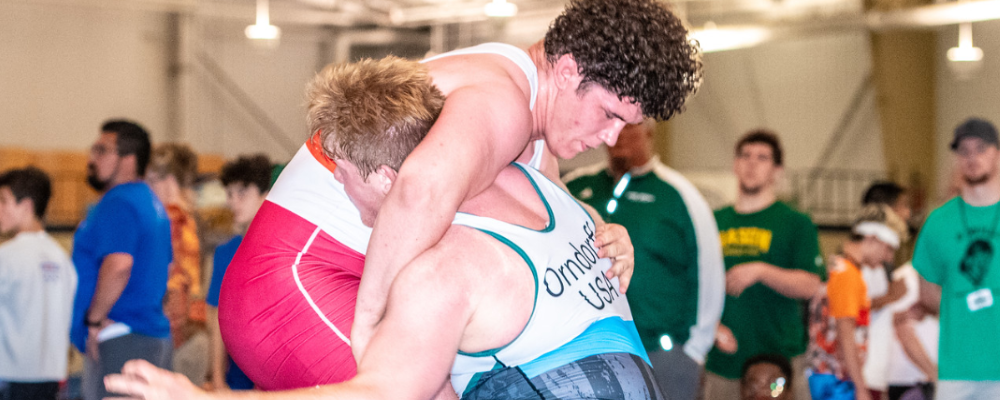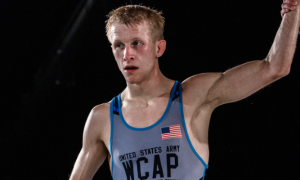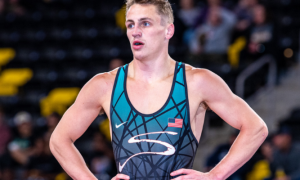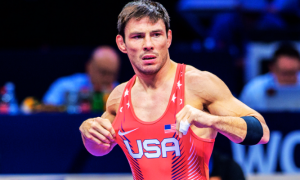Here is one way that makes it easy to tell how busy things have been lately: counting today’s entry, five of the last seven Monday Roundups feature the word “wrapped” in the title.
“Wrapped” — as in, a tournament of seeming significance has now been completed and a general overview is about to reach your eyeballs. Just to think, there is still the Junior Duals and the Senior Trials to plow through before July even hits. And then there will be the Cadet Worlds, Fargo, various camps, the Seniors in Germany, the Junior Worlds, the Senior Worlds… There is a mountain of activity on the horizon and the potential for some special moments to be had by all involved who are locked into our sport.
Will some of those special moments come courtesy of the US Junior Greco-Roman World Team? Many seem to believe that is the case — even if the collective level of international experience isn’t sky high up and down the lineup. But part of that is due to several athletes who in order to prevail had to overcome the kind of experience we tend to yammer on about. Either way, this Junior Team is an excellent mix of seasoning and fresh-but-motivated talent.
And it starts at the very first weight class, 55 kilograms, where Brady Koontz (Unattached) downed returning Junior World silver medalist Cevion Severado (NYAC) in two straight. Koontz, a long, wiry athlete, attacked from a bent-knees-mostly-hips-in stance that is the preferred posture in Greco-Roman wrestling. His stance alone is not why he won — it helped, but so did the fact he and his brother Dylan had conducted a brunt of their preparation under Dennis Hall, along with both being talented wrestlers to begin with. Koontz was able to keep his legs underneath him, but he was also able to force scoring opportunities off of exchanges, a terribly difficult task against someone as gifted and speedy as Severado is and can be.
Before the Wisconsinite met Severado in the best-of-three, he defeated Junior National runner-up Joey Harrison (MWC) via fall, important to note because Harrison — like Severado, like Dylan Koontz and last year’s Trials winner Elijah Varona (Garage Boyz) — is a wonderful prospect who no one would have complained about should he have wound up on the squad headed for Slovakia. But Koontz has demonstrated that he knows how to utilize his attributes effectively, which against Harrison and others before him, came in the form of double underhooks. Koontz and fellow ’18 World Teamer Tyler Dow (72 kg, Badger RTC) can just walk right into the position thanks to their long arms. Koontz double-under’ed Harrison, clasped high around back, and dumped him over to secure the pin.
Coaches, fans, people who care — all enjoy knowing that an incoming World Team member rose above a deep field in order to come out on top. It is why this country’s Trials system is set up this way, with qualifying procedures capped off by a best-of-three. 55 had a lot going for it in Indianapolis, and by extension, there is confidence in the winner. The same can be said for 60 kilograms even if only five athletes showed up for Friday’s mini tournament. Two-time Cadet World Team member Malik Johnson (Unattached) valiantly battled Benji Peak (NMU/OTS) but fell just short of appearing in his third consecutive World Championships. Koontz and Dow might have length on their side, but at 6’0 tall Peak blows them both out of the water. What Peak also has, aside from a knockdown ability to get to the body, are three overseas medals in his first year of full-time training, not to mention approximately four weeks’ worth of foreign camps under his belt.
Despite winning the World Team Trials, Peak is not yet an actual World Team member. He first has to wrestle-off 2016 Junior World bronze Taylor LaMont (Sunkist). Whether you agree with this procedural wrinkle or don’t, the one thing to focus on is this: regardless of who emerges between Peak and LaMont, the 60-kilogram rep for the United States in September should be considered a strong medal contender.
Peak’s Wisconsin pal and NMU teammate Alston Nutter (63 kg) was the most dominant finalist waiting in the wings on Friday as he breezed past the incredibly tough Dylan Gregerson (UVRTC) via a pair of tech falls. Counting his four matches at the Junior Nationals in April, Nutter sealed up his first World Team appearance outscoring five opponents in six matches 51-2. But this could have been predicted. Nutter committed to NMU in 2016 following his sophomore year of high school. Greco is all he does, save for what goes on in the classroom, and he did not excel immediately. Nutter put in the work through Year 1 and began this season with a gold in Denmark, a bronze in Sweden, and later earned a silver in Austria. This is an athlete who knows what awaits him on the World stage. Think he won’t prepare accordingly?
It goes on like this. Peyton Omania (67 kg, Unattached) and Dominick Demas (OU) entered action on Friday with four World Team Trials victories between them. Demas — a lights-out talent if there ever was one — was a two-time Cadet World Teamer and a member of last year’s Junior delegation. Omania was on the ’16 Cadet Team and is a three-time Junior Greco World Duals individual gold medalist. Andrew Berreyesa (82 kg, FLWC) is a first-timer, but he has traveled and trained, and his RTC is one of the very few in the country where there are living, breathing Greco athletes and a highly-respected, authentic Greco-Roman coach in Ahad Javasalehi. Do we really need to bring 2017 Cadet World Champion Cohlton Schultz (130 kg, NYAC) into the discussion and list all of the things that young man has already accomplished?
In last week’s Roundup, we highlighted the impact of relevant overseas experience and how that played into who made the Cadet squad. Naturally, the Juniors have that working in their favor, too, save for Koontz, Dow, Barrett Hughes (87 kg, CRTC/TMWC) and Chad Porter (97 kg, Sunkist), who were all extraordinarily impressive Friday. There is just a lot to feel good about pertaining to this year’s Juniors with a decent amount of time leading up to the Worlds to feel even better.
Notes:
- 77-kilogram Trials champ Anthony Mantanona (OU) is reportedly not going to wrestle-off reigning World Champ Kamal Bey (Sunkist), automatically giving Bey his third consecutive Junior WT spot.
- Peak and LaMont will wrestle-off on June 30th in Atlanta, Georgia.
Not One, But Two Medalists
We reported yesterday that Nate Rubino (45 kg, MWC) earned gold at the 2018 Refik Memišević-Brale Tournament in Subotica, Serbia over the weekend. However, he was not the only US medalist. Fellow Nebraskan Caden Arps (MWC) grabbed silver at 48 kilos for his first-ever international medal. “What a surprise this young man was for his first overseas trip,” said Cadet World Team coach Lucas Steldt, who is in Serbia with the Cadets. “He steps on the mat and lets it fly, immediately hitting a shoulder throw and goes up 4-0. From then on out it’s a firefight. A great match for gold that was offense, offense. Attempts and attempts at scoring points. By the time the bout was over, Caden just didn’t score enough points fast enough or first.”
Rubino and Arps represented the two American medalists. Three other athletes competed at the Refik Memišević-Brale Tournament but finished without a victory. Steldt is providing 5PM with constant updates and photos, which we will package together in a tour journal of sorts for you tomorrow.
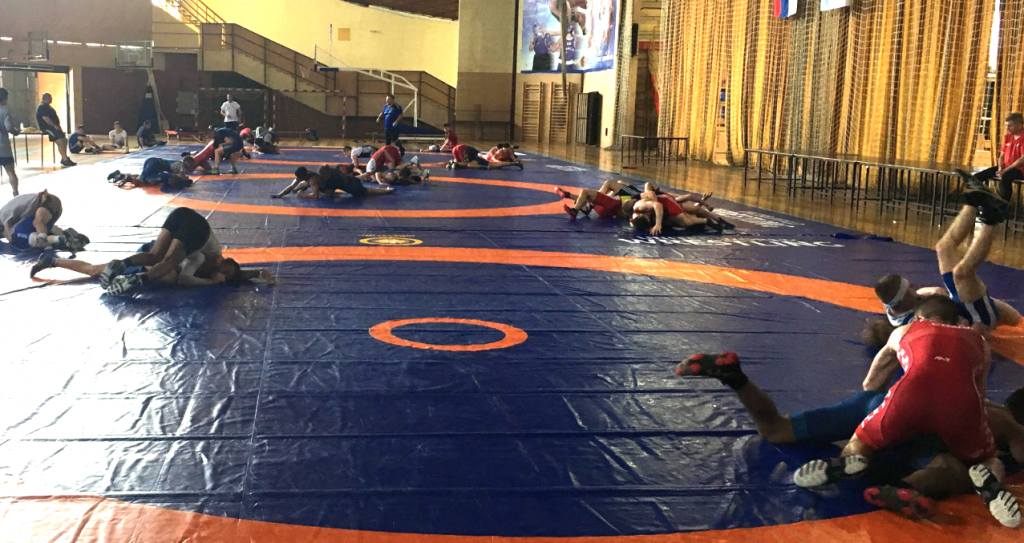
The US Cadets began a week-long training camp in Serbia today. (Photo: Lucas Steldt)
Dominguez Answers Questions
We’ve been seeing it (and writing it) a lot lately, “MWC this, MWC that.” Zac Dominguez, founder of the hugely successful club in Nebraska, has been highlighted here multiple times before but we felt the need to catch up given the recent surge of success coming from his charges both domestically and abroad. In addition, Dominguez is also serving as a coach with Spenser Mango for the 2018 Senior World Team, so we wanted to check his pulse regarding plans coming up for that, as well.
5PM: We talked last summer about how Nebraska has been undercover influential in turning out solid, successful Greco athletes and this year your club has multiple Cadet World Team members and several athletes at other levels who are performing well. Is this a matter of some kids who were young starting to come of age along with the result of an effective system being put in place?
Zac Dominguez: I would definitely say they started to come of age. James Burkes is the oldest a UWW Cadet can be. I tell you what, he’s an old-time boxer, he is always standing vertically. He didn’t compete last year at UWW Cadets because he had surgery on his hand, so he came up to me before the tournament started and said, “Coach, these are two-minute periods with eight-point techs, right?” Yes. He goes, “Oh man, ooooh man, Coach, you just made my weekend!” He is the king of the three-rounders, you know what I mean? He will just smack you around, I watch him do it in the room all the time. Strategically, he has no technique, he has no tactics. He just knows what wrestling is, Stand up and let’s just do this.
His brother on the other hand (Jakason) is a student of the sport. He is refined, he always asks questions, he wants to learn, takes on new positions and works his way through it. Jakason’s par terre from last year to this year has improved ten-fold, and that was the difference for him, obviously, at UWW Cadets. He wrestled Matt Ramos in the semis and Jakason got the passive call. He understands how to get the passive call, put Ramos down, tech falled him in the first period. 9-0, done. All he needed to do was get on top and he understood that.
But this is still a learning process. I told him, “You’re not going to get the passive call in Europe first, you’re going to have to work differently.” And of course, right away, he’s like, Okay, what do I have to do differently? I told him we need to get a takedown, worst-case scenario we have to be able to get on top. He has a lot of tools, he likes a two-on-one, he has body attacks. Jakason is not a big underhooker, so he likes the two-on-one quite a bit, whereas James is an underhook wrestler and loves to go to the body. Big throws — I bet James had ten five-point throws at UWW Cadets. Easily. He’s a human highlight reel, and Jakason is smart, methodical, and he’ll turn-you-over. He loves “Par Terre Tuesday”, that’s my practice where all day long we do par terre and we’re up to like, 120 go’s on Tuesdays. That’s where we’re up to now.
Phillip (Moomey) of the Golden Eagles, his coach Dalton Jensen won a Greco national title for me. He’s my brother’s age, they were training partners. Dalton is a kid I coached who started a club in Kearney and he is also a University of Nebraska-Kearney head coach. I help him through practices, with schedules, and I do a ton of work with him, so I know his style and I know how he does it. Phillip used to come stay with me before Dalton started his club and he is in a good way. He’s got lineage training and all the right things going.
But these kids, they’re old enough now and starting to age out. Like you and I were talking about earlier with 18 and 19-year-olds, my expectation is that they should be making Teams, but I have to remember they are 14, 15, and 16, and I have to make sure I am not overworking them too much. Like little Conor Knopick, I love him to death, but he’s a little burnt right now. He was tired, he put a lot into UWW Cadets, lost to (Dylan) Ragusin 7-7, made it back to third place and did great. But then it was, Hey, you’re going to Europe next, and he said, “I’m tired, Coach.” I was like, I know, when you get back I’ll give you a week off. You don’t have to go to Junior Duals. Just stay home and take the week off. He goes, “Really?” Yes. That really changed his perspective, but you know, Conor is 15-years-old and he’s wrestling high-level matches. It’s the same thing with Camden (Russell), I have to make sure I give them enough downtime.
These boys are the product of good coaching. I have several coaches on my staff who are equally as talented as I am. I’m the front man but I have so many good coaches and board members who allow me to create this process for them, and they let me get after them when I need to.
But is it coming of age? Yes. I think we could have been a year ahead, to be honest with you. But I will say to watch out for what’s behind because I have fifth-graders and fourth-graders where the first thing they ever did when they came to me was wrestle Greco, not folkstyle or freestyle. I am really waiting for them to come of age.
5PM: You mentioned “Par Terre Tuesdays” as one of your club’s points of emphasis. Domestically, Junior and below is wide open with points scored from all over, sometimes sloppy, sometimes not. But at the World level, the age groups can still be a game of “turn and not be turned” as it is for Seniors. Did you implement “Par Terre Tuesdays” due to par terre a lot of times being neglected at age group domestically, or is it a mechanism to prepare kids for international competition more adequately?
Dominguez: For sure, it is neglect first for me. To be honest, when I was a Senior-level wrestler, I loved par terre. I loved getting on top and turning. That was the gift I got. If I scored a good takedown, I knew I could get on top and score points.
It started off with me saying, Guys, domestically, we need to get better at par terre because our win count in matches will skyrocket. And from one year to the next, my kids who loved freestyle and Greco but weren’t quite winning matches were like, Oh wow, we should have been doing this years ago. They starting getting four or six points. They could be down 4-0 or 6-0, but they knew if they got on top that the score could be 4-4 or 6-6. It wasn’t a problem for them anymore.
But really, for long-term development par terre is such a huge part of Greco. Look at Roman Vlasov (77 kg, RUS). His par terre is unbelievable. Boring as hell sometimes on the feet, but if he gets on top of you he is going to turn you. He’s going to lift you and he’s going to throw you. It’s going to happen. And I told them (students), The moment you start stepping out on the World level, if you can’t turn opponents on top — AT ALL — the foreigners will not respect you. I honestly believe they view it that way, that they go, This guy is a good wrestler, a good athlete, but he’s not good on top so I don’t care if I go down. I’ll take my time. I know they don’t respect our par terre.
The difference comes with a guy like Andy Bisek. If he got on top, he turned you, right? That’s why he has two (World) bronze medals. The guys who were separating themselves, Matt Lindland and all of these guys who reached the highest level, they were turners on top. They might have gotten turned on bottom, but they turned opponents more than they got turned. That’s why I told my kids for when they start stepping out onto the World stage to make them respect our par terre. Because right now, that’s the foreigners’ rest. They’re like, I don’t care, I’ll go down. No problem, I’ll catch my breath and rest because the American is never going to turn me.
I instilled that in them because I want them to be angry. Not overly angry, but defiant, like, What do you mean you don’t think I can turn you? But right now, if you were to tell a wrestler from Russia or Hungary that an American is going to get on top, they wouldn’t even fear it. That’s the point I was trying to get across to the boys and girls in our room When you get on top, it’s an attitude, We will turn you. I’ve said, I don’t want you to ever get turned on bottom, I know it’s near-impossible to say that, but no matter what, you will always turn somebody on top. It has to be that way. Now, their opponents will think to themselves, Gosh, I don’t want to ever get put down — which will open up the feet and make their attacks more effective.
5PM: What do you know right now pertaining to the Senior World Team in regards to camps and overall preparation?
Dominguez: We have Tulsa coming up and then Matt (Lindland) is going to take them to Oregon, and I am actually going to have to opt out of that one because I am going to Germany with them for the Grand Prix in August. Matt is going to take all ten athletes out to Oregon so they can get to know each other better and become a working Team. I think that is good because we have a lot of athletes who come from the Armed Forces and then we have a smattering of individuals who don’t, like Kamal Bey and others in a small working group. Maybe some NMU guys fit in there, maybe another college kid. What Matt is going to try to do is put that Team together and let them feel good about who they are and where they’re from, whether they are from the Army, the Marines, or you’re Ben Provisor (87 kg) from Penn State. This is Team USA and they have to be together on this, help each other out, hold each other up, and let go of any rivalries.
There’s that movie with Kurt Russell, Miracle, right? I think that Matt saw it (laughs). You take all these kids from different parts of the country who maybe were the best, maybe they weren’t, maybe they were okay, but you put them together and now they are a Team. If you can compete with each other and for each other, honestly, our Greco-Roman can pass that threshold and jump that barrier into becoming, maybe not a powerhouse right away, but a force where instead of saying, Who cares?, foreigners are like, Damn, I drew the American first match. They’re going to go, Shit, I have to get ready and go to work now. I can’t just cruise through a match.
I think that’s what Matt wants and is trying to accomplish. He is putting a team together and making us a force together. We have camp from August 6th to the 11th and then we are going to come back and we’ll be in Vegas. Then we’re back in Colorado Springs, head to Germany, and then we’re home for a little bit. In October, we have a long trip over there. I will be coming in for the second week of acclimation camp in Hungary. Then we go to the tournament and come home.
Matt understands I have to work, he’s been very good with everything. Spenser and I have talked as many times as we can regarding where he and I are going to be. Obviously, he is likely going to have several guys on the Team so I asked him what could I do ahead of time. He has sent me videos so I can watch them that way if he needs a second I can be helpful with my towel and water (laughs). Maybe I can reiterate or help in some way in the corner. I want to be a part of the team, right? Everyone wants to be part of the force, no one wants to be a weak link and I definitely won’t allow myself to be a weak link. So if that means I have to be the best towel boy ever, then I will be the best towel boy ever. You better believe that.
5PM: You’ve got so much going on and I know it’s not completely concurrent, but it’s still so much stuff to do and a ton of responsibilities. But this year for you seems extra busy and especially packed. With being so busy and experiencing such success, how do you find balance and breath-out periods for yourself?
Dominguez: I really plan a lot. I sit down with my wife at the beginning of every month. She knows when I am going to be gone, my work knows. I am months ahead of myself for work, for practice. I write out my practice plans in advance and give them to my coaches so they can run practice here at MWC. If you don’t have a plan, you don’t even know how you failed. I always tell my wrestlers, If you don’t do anything in a wrestling match, how can I coach you? How can I help you through a match if you don’t do anything? If you get tech falled in a match where you tried ten different things? Awesome, I can help you. But if you get tech falled 10-0 because you’re afraid of the guy? I can’t help you. So if I failed, it’s because I didn’t plan it out right. That’s the truth.
My wife is great, she keeps me organized with our four daughters. One of my daughters is getting high up there in gymnastics, she is doing really well and practicing 16 hours a week, which I think is amazing that a seven-year-old can do that. But they plan it out. Every quality coach or club, there is a plan. I am always writing down a plan or a schedule and giving it to other people. Here, have this, keep me in line. I have other people help me, but it’s basically me saying, Here’s what I am doing. I am going to do it, but I need you to hold me accountable.
It’s almost like being an athlete. If I didn’t have a team behind me there is no way I could be the coach. No way. I have everyone hold me accountable. So if I tell my wife I am going to be home, just tell me what I’m supposed to do, if I am supposed to be with the girls or whatever I have to do, and she has no problem doing that. It’s the same thing with my athletes. I tell them, If I’m home and we’re supposed to work out, make sure you hold me accountable that way we can do that one-on-one together and we can close the circle on what we were talking about. And they do, they have no problem holding me accountable and that makes me a better coach. I’ll say, If you guys expect me to be an Olympic or World-level coach, I expect the same from you. We have that expectation of each other.
2018 NCWA Go Greco National Championships Results
The 2nd annual NCWA Go Greco National Championships took place on Saturday at Richland College in Dallas, Texas. Unfortunately, the Facebook Live broadcast of the finals that was scheduled last-minute never materialized. Participation also didn’t increase from Year 1, which is a shame because this could be a valuable resource to direct capable wrestlers towards a future in Greco-Roman.
Andrew Willi (Texas State) was a repeat winner at 59 kilos, and Foster Griffin (UNT) was once again his runner-up. Cassidy Collins (75 kg, UNT) also collected his second-straight national title — but he was the only competitor in his bracket.
59 kg
Gold: Andrew Willi (Texas State)
Silver: Foster Griffin (UNT)
66 kg
Gold: Assad Muhammad (Richland)
Silver: Taylor Swanson (UNT)
Bronze: Jorge Vargas (UNT)
71 kg
Gold: Scott Akers (UNT)
75 kg
Gold: Cassidy Collins (UNT)
80 kg
Gold: Drake Dudley (UNT)
Silver: Dustin Basham (Richland)
Bronze: Jake Wright (UNT)
85 kg
Gold: Dominic Vazquez (TOL)
Silver: Quinn Redmond (UNT)
Bronze: Steve Rodriguez (Richland)
98 kg
Gold: Garrett Hadley (UTA)
Silver: Kevin Marshall (Western U)
Bronze: Ali Aftabi (Texas Tech)
130 kg
Gold: Ikaika Neal (UNT)
Silver: Andres Briones (USC)
Bronze: Ladarius Bennett (Richland)
Superior Camp Began Today
The 2018 Superior International Camp kicked off this morning at the Olympic Training Site on the campus of Northern Michigan University. As usual, over a dozen Swedish athletes are also participating, so everyone in attendance should get plenty of different looks from their partners. That’s part of what makes the Superior Camp such an important asset to the US program. It’s redundant — the word “international” is right there in the title. But this is not a regular occurrence. Age-group athletes in the United States have two opportunities each year to train with foreign partners without flying across the Atlantic — the annual Junior Greco World Duals and this camp up at NMU.
And part and parcel with the Superior Camp is the always-awesome dual meet pitting the US against Sweden. This whole thing is about fellowship, education, and improvement but the dual is not unimportant or some informal competitive exercise. It differs even more in 2018, particularly because the Americans emerged victorious for the first time in history over Team Skåne Brottning back in November. There will be some familiar names involved, a few new ones, but it should be a sight to see no matter what (if it is streamed live). One way or the other, you can look forward to what happens with that on Wednesday evening. On our end, we will be providing a camp report featuring one of the coaches towards the end of the week as well as a recap of the dual.
Questions? Concerns? Feel like reaching out? Do so on Twitter, Facebook, and Instagram!
SUBSCRIBE TO THE FIVE POINT MOVE PODCAST
iTunes | Stitcher | Spreaker | Google Play Music | RSS


